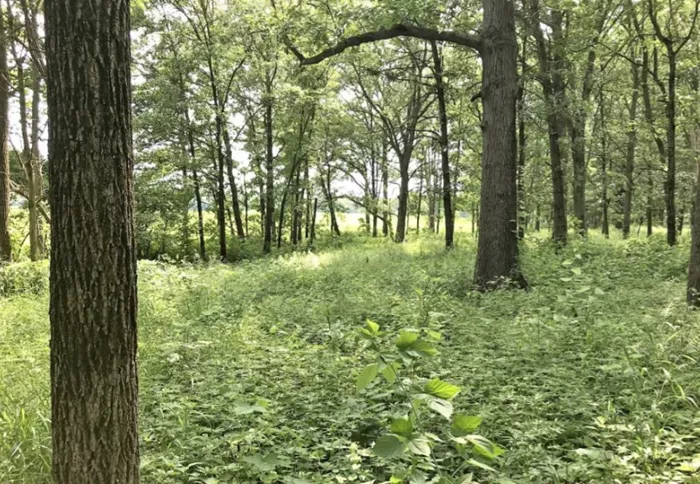MONTICELLO, Ill. (WCIA) — As autumn settles in, Allerton Park officials are urging Monticello residents to be on the lookout for invasive plant species still thriving in the area. These plants, often seen maintaining their green leaves long after native species have shed theirs, can be harmful to local ecosystems.
Bush honeysuckle, a common invasive species in Central Illinois, is easily recognizable by its bright red berries. According to Nate Beccue, the Natural Areas Manager at Allerton Park and Retreat Center, European Privet, identifiable by its maroon-colored berries, has also become a significant issue. Originally from the Formal Gardens, it has spread throughout the region since escaping decades ago.
Beccue explains that now is the ideal time to spot invasive species in both residential yards and surrounding forests. Their green leaves remain visible, making them stand out amid the changing foliage of native plants. “Bush honeysuckle doesn’t lose its leaves right away,” Beccue noted. “If you notice something still green, it’s likely not native.”
Invasive plants, including multiflora rose, oriental bittersweet, garlic mustard, and burning bush, can significantly impact biodiversity. These species tend to dominate and shade out native plants like bluebells and spring beauties, threatening the growth of local flora and wildlife. Beccue emphasized that, if left unchecked, invasive species can reduce a diverse plant community to just one or two species.
“Those plants thrive when the ground is clear and sunlight is abundant,” Beccue said. “Bush honeysuckle, for example, grows early in the season, overshadowing other plants.”
At Allerton, crews work to manage invasive species by cutting down large plants and conducting prescribed burns during both the fall and spring. In residential areas, University of Illinois Extension Forester Christopher Evans advises homeowners to manually pull small plants and treat larger ones with herbicides to prevent regrowth.
“It’s critical to manage these plants,” Evans said. “They can quickly overrun an area and disrupt the delicate balance of our native ecosystems. By controlling them, we help preserve native plants and maintain wildlife habitats.”
For more information on invasive species and their management, residents are encouraged to visit the Allerton Park and Retreat Center website or the University of Illinois Extension.
Related topics:
- Small But Powerful Efforts Are Reviving Native Forests in Southern India’s Tea Country
- Cold-Hardy Plants Ready to Flourish, Says Landscaper
- Denmark to Plant 1 Billion Trees and Transform 10% of Farmland into Forest


